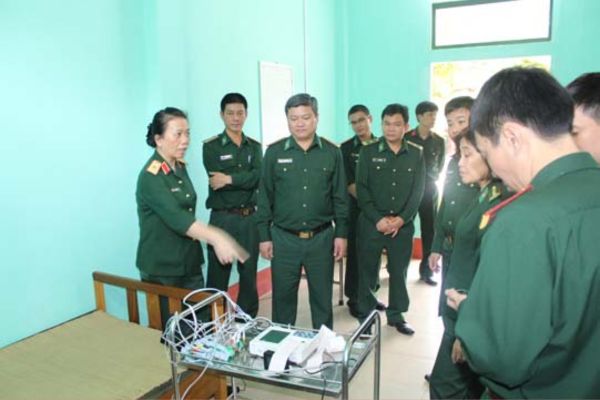Regime and Policies for Cryptographic Workers Retiring, Changing Sectors, or Resigning - Non-Military Personnel and Non-People's Public Security Force.
Regimes and Policies for Cryptographic Workers Retiring, Changing Careers, or Resigning without being Military Personnel or CAND
According to Article 35 Law on Cryptography 2011, the policies for cryptographic workers who are not military personnel or People's Public Security forces retiring, changing careers, or resigning are as follows:
(1) Cryptographic workers who are not military personnel or People's Public Security forces upon retirement are entitled to the following benefits:
- Receive pension according to legal regulations;
- Are provided with conditions to stabilize their lives by local authorities where they reside;
- Receive medical examination and treatment according to health insurance benefits at medical facilities of both military and civilian sectors.
(2) Cryptographic workers who are not military personnel or People's Public Security forces upon changing careers are entitled to the following benefits:
- Retain their salary level at the time of career change for a minimum period of 18 months;
- In cases of re-assignment to serve in the cryptographic force upon request, the career change period is counted as continuous service time for consideration of rank, salary level, and seniority;
- Upon retirement, the seniority allowance is calculated based on the service time in the cryptographic organization at the time of career change and added to the average monthly salary as the basis for pension calculation.
In the event the pension calculated at the time of retirement is lower than the pension calculated at the time of career change, they are entitled to the pension calculated at the time of career change.
(3) Cryptographic workers who are not military personnel or People's Public Security forces upon resignation but do not meet retirement conditions are entitled to the following benefits:
- Receive job creation allowance, one-time severance allowance, and social insurance benefits according to legal regulations;
- Are provided with conditions to stabilize their lives by local authorities where they reside;
- In cases where they have served in the cryptographic force for 15 years or more, they are exempted from or given a reduction in hospital fees as regulated by the Minister of National Defense when receiving medical examination and treatment at military medical facilities.

Regimes and Policies for Cryptographic Workers Retiring, Changing Careers, or Resigning without being Military Personnel or CAND (Image from the Internet)
Who Works in Cryptographic Organizations?
Pursuant to Article 23 Law on Cryptography 2011, those working in cryptographic organizations include:
- Individuals mobilized, seconded, or appointed to perform tasks of the cryptographic force (referred to as cryptographic workers);
- Individuals selected for training, professional training, and cryptographic skill training;
- Individuals working in cryptographic organizations but not covered under point a and b of Clause 1, Article 23 Law on Cryptography 2011 (also known as other workers in cryptographic organizations).
Are Cryptographic Workers Not Subject to Professional Seniority Allowance Cancellation During the 2024 Salary Reform?
Based on point d, clause 3.1, Section II of Resolution 27/NQ-TW 2018 which stipulates:
Content of Reform
3.1. For officials and public employees and armed forces (public sector)
...
d) Re-organize the current allowances, ensuring that the total allowance fund does not exceed 30% of the total salary fund.
...
- Combine professional incentive allowances, professional responsibility allowances, and hazardous and dangerous allowances (collectively known as professional allowances) applied to officials and public employees in professions with higher-than-normal working conditions and appropriate state preferential policies (education and training, healthcare, judiciary, prosecution, civil judgment enforcement, inspection, audit, customs, forestry, market management,...). Combine special allowances, attraction allowances, and long-term service allowances in areas with extremely difficult socio-economic conditions into allowances for working in specially difficult areas.
- Abolish professional seniority allowances (except for military, police, and cryptographic forces to ensure salary correlation with officials); leadership position allowances (as leadership positions in the political system are arranged to receive salary based on position); party, mass organization allowances; and public service allowances (as these are already included in the basic salary); hazardous and dangerous allowances (as the working conditions with hazardous and dangerous factors are already incorporated into the professional allowances).
- Newly stipulate allowances based on classification of administrative units at the communal, district, and provincial levels.
- Consistently apply a monthly allowance fund for non-specialized activists at commune, village, and neighborhood levels based on the recurrent expenditure ratio of the communal People’s Committee; simultaneously stipulate the maximum number of non-specialized activists according to each type of commune, village, and neighborhood. Based on this, the communal People’s Committee proposes that the People's Council of the same level specifically stipulate the positions entitled to allowances, ensuring that one position can undertake multiple tasks but still assures the quality and effectiveness of the assigned work.
...
Accordingly, the professional seniority allowance is one of the allowances that will be abolished during the salary reform.
However, for cryptographic workers, the professional seniority allowance will not be abolished.
The reason stated in Resolution 27/NQ-TW 2018 is to ensure salary correlation between the military, police, cryptographic forces, and officials.
LawNet